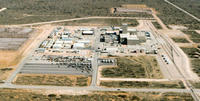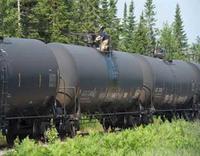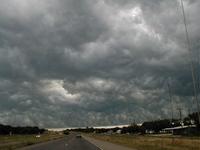-
Airports resist bolstering perimeter security because of cost
Last month’s security breach at Mineta San Jose Airport, in which a teenager entered the airfield and hid in the wheel well of a Maui-bound flight, has highlighted concerns about the security of airport perimeters. Perimeter intrusions are common at airports, but airports resist pressures to improve perimeter protection because of the costs involved. Experts note that if we were to string all of the U.S. airport perimeters together, we would approach the length of the U.S. border with Mexico and security expenditures approaching a billion dollars. These experts say that airports are not likely to invest heavily in perimeter security until a serious disaster due to lax perimeter security occurs. “Show me a body count, and we’ll build a fence,” said one airport administrator.
-
-
Algae biofuel can help meet world energy demand
Microalgae-based biofuel not only has the potential to quench a sizable chunk of the world’s energy demands, researchers say. Microalgae produces much higher yields of fuel-producing biomass than other traditional fuel feedstocks and it does not compete with food crops. The researchers say that algae yields about 2,500 gallons of biofuel per acre per year. In contrast, soybeans yield approximately forty-eight gallons; corn about eighteen gallons.
-
-
Future cyberattacks to cause more trouble than Heartbleed
Many of the future cyberattacks could take advantage of vulnerabilities similar to Heartbleed, a major Internet security flaw which allows attackers to gain access to encrypted passwords, credit card details, and other data on trusted Web sites including Facebook, Gmail, Instagram, and Pinterest. A new report said that hackers could soon use similar holes in computer security to shut down energy grids, disrupt public services, and steal vast amounts of private data worth billions of dollars, unless institutions take measures today to ready themselves against future Heartbleed-like threats.
-
-
Dramatic drop in Central Valley wintertime fog threatens California’s agricultural industry

California’s winter tule fog — hated by drivers, but needed by fruit and nut trees — has declined dramatically over the past three decades, raising a red flag for the state’s multibillion dollar agricultural industry, according to researchers at UC Berkeley. Many crops go through a necessary winter dormant period brought on and maintained by colder temperatures. Tule fog, a thick ground fog that descends upon the state’s Central Valley between late fall and early spring, helps contribute to this winter chill. The findings have implications for the entire country since many of these California crops account for 95 percent of U.S. production.
-
-
Power plant emission detection by satellites verified

Air pollution and greenhouse gas emissions from two coal-fired power plants in the Four Corners area of northwest New Mexico, the largest point source of pollution in America, were measured remotely by a Los Alamos National Laboratory team. The study is the first to show that space-based techniques can successfully verify international regulations on fossil energy emissions.
-
-
Pressure grows for building a centralized nuclear waste repository
In 2010, after $9 billion and twenty-five years of construction, the Obama administration pulled the plug on the Yucca Mountain centralized nuclear waste repository. Toxic nuclear waste continues to accumulate on the grounds of U.S. nuclear power plants, with concerns growing about the security of keeping so may tons of such toxic materials in such a dispersed manner. Concerns have been heightened lately by the wave of closing, for economic reasons, of nuclear power plants, and worries about the safety of radioactive waste remaining behind on the grounds of shuttered plants. Senate Bill 1240 calls for the development of a Nuclear Waste Administrationto take responsibility for transporting and storing nuclear waste, and find the right geological location for a new centralized repository.
-
-
Cracked lid of a nuclear waste container may be source of WIPP radiation leak
The radiation leak at the Waste Isolation Pilot Plant (WIPP) near Carlsbad, New Mexico has been linked to a waste container shipped from Los Alamos National Laboratory (LANL), raising questions about the safety of other containers stored at the lab’s northern New Mexico facility and at the Waste Control Specialists (WCS) site in Andrews, Texas.As a precautionary measure, LANL has been ordered to remove thousands of similar containers filled with toxic waste from outdoor storage. Critics of nuclear waste storage practices have blamed the recent radiation accidents on a diminishing culture of safety at the fifteen-year-old WIPP.
-
-
Floating solar power plants offer many benefits
Water-based solar plants are at least 50 percent more efficient than a land-based solar power system.The water on which the plant floats helps extending the life of the photovoltaic panels, meaning greater efficiency and performance from the solar panel system, and the plant also prevents nearly 90 percent of the evaporation for the surface area that it covers, an important benefit in dry climates.
-
-
Cesium chloride blood irradiators increase dirty bomb risk
Federal officials want to halt the use of blood irradiators used by hospitals and blood centers to ensure that blood is properly treated before transfusions occur. The irradiation devices contain cesium chloride, a highly radioactive powder which terrorists could use to make a dirty bomb. A 2008 reportby the National Academy of Sciences recommended stopping the licensing of new cesium chloride radiation sources, thereby encouraging the adoption of alternative sources with a less dispersible form of radioactive cesium, including cobalt-60 or X-ray irradiators.
-
-
Bill would encourage development of drugs to treat antibiotic-resistant bacteria
The U.S. Centers for Disease Control and Prevention(CDC) reported that two million Americans are infected by antibiotic-resistant pathogens every year, and the pathogens cause 23,000 deaths annually. In 1990, about twenty pharmaceutical companies had large antibiotic research and development programs, but today only three large firms and a few small companies are investing in antibiotic research. A new proposed bill, the Developing an Innovative Strategy for Antimicrobial Resistant Microorganisms Act, would encourage pharmaceutical companies to develop new drugs to treat antibiotic-resistant bacteria.
-
-
New Mexico demands clarifications, reassurances on WIPP radiation leaks

New Mexico’s environment secretary Ryan Flynn has ordered the Department of Energy (DOE) to explain how it will protect public health and the environment while it investigates a radiation leak at the underground Waste Isolation Pilot Plant (WIPP). The plant has not been in compliance with various permit requirements since the February underground fire and radiation leak, which eventually led to a plant shutdown.
-
-
U.S. to require railroads to notify states when oil is shipped

With the increase in available oil from fracking and larger pipeline capacity, railways are moving more and more oil. Rail companies moved 400,000 oil carloads in 2013, dwarfing 2005’s 6,000 oil carloads. The increase in oil shipments of oil has led to an increase in the number of accidents involving oil tankers. In the wake of recent accidents, the U.S. Department of Transportation (DOT) has released an emergency order to railroad companies which is designed to reduce the risk when shipping crude oil across the nation.
-
-
April storms lead to first billion-dollar losses of 2014

The outbreak of severe weather throughout the United States and other parts of the world in April will prove to have caused the largest economic losses since 2013, according to a report. During the month in the United States, at least 39 people were killed and 250 injured amid nearly 70 confirmed tornado touchdowns, which occurred across more than 20 states in the Plains, Mississippi Valley, Southeast, Midwest, and Mid-Atlantic.
-
-
Research reconfirms that public investment in scientific research promotes growth
New and independent research has reconfirmed and quantified some of the economic and societal benefits of public investment in scientific research. The report says that for every £1 spent by the U.K. government on R&D, private sector R&D output rises by 20p per year in perpetuity, by raising the level of the U.K. knowledge base.
-
-
Leaders of Chinese city delay alerting residents to deadly radiation risk
Authorities in the East China city of Nanjing delayed,for thirty-six hours, notifying residents about the loss of deadly isotope iridium-192 pellets at a local industrial plant. The pellets disappeared on Wednesday, and plant officials informed government authorities on Thursday – but did not inform city residents until Saturday. The extremely toxic pellets, the size of beans, were found the following Saturday in an open field one kilometer from the plant. The plant management detained four employees at the plant on Sunday for violating radioactive work regulations and storage rules, and they are likely to face criminal charges.The plant is using the isotope to find flaws in metal components.
-
More headlines
The long view
Factories First: Winning the Drone War Before It Starts
Wars are won by factories before they are won on the battlefield,Martin C. Feldmann writes, noting that the United States lacks the manufacturing depth for the coming drone age. Rectifying this situation “will take far more than procurement tweaks,” Feldmann writes. “It demands a national-level, wartime-scale industrial mobilization.”
Trump Is Fast-Tracking New Coal Mines — Even When They Don’t Make Economic Sense
In Appalachian Tennessee, mines shut down and couldn’t pay their debts. Now a new one is opening under the guise of an “energy emergency.”
Smaller Nuclear Reactors Spark Renewed Interest in a Once-Shunned Energy Source
In the past two years, half the states have taken action to promote nuclear power, from creating nuclear task forces to integrating nuclear into long-term energy plans.
